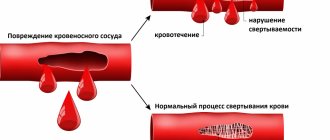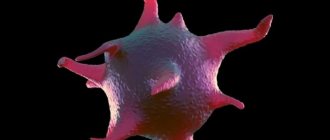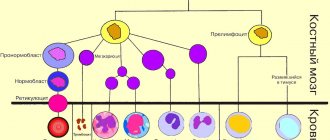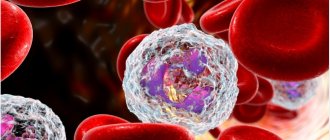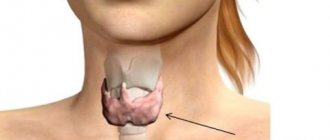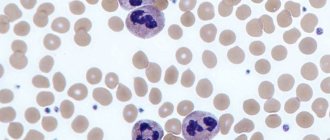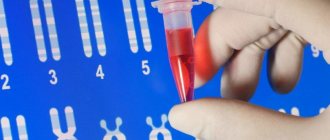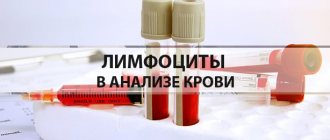What function do basophils perform in the body?
What are basophils?
Basophils are a type of white blood cell. They have a round shape. Their core is divided into segments. When stained with alkaline dyes, they acquire a dark purple color. This distinguishes them in a blood smear from neutrophils and eosinophils.
Where are they formed?
Like all blood cells, basophils are formed in the bone marrow. The precursor of basophils are basophilic myeloblasts.
All granulocytic leukocytes (basophils, neutrophils, eosinophils) have a common precursor - the myeloblast cell. From it, during differentiation, the corresponding cells develop.
Basophils are granulocytic leukocytes. This means that in the cytoplasm of these cells there are granules containing various substances.
Normal blood content
Basophils are normally found in very small quantities in the blood.
There are two ways to express the number of basophils: absolute and relative. Relative - the number of basophils and other leukocytes per 100 counted cells is calculated. Absolute – expressed as the number of cells per 10*9 per liter of blood. Normally, the relative number of basophils is 0 – 1%. Absolute – 0.01 – 0.065 per 10*9 per liter.
Main functions
The functions performed by basophils are determined by the content of their granules. The granules contain various substances, for example, serotonin, histamine, prostaglandins, in general, mediators of allergic and inflammatory reactions.
Therefore, basophils determine the development of inflammation and allergy reactions.
What are basophils, functions
In the KLA, the indicator is present in the leukogram. Basophils are blood cells from the group of granulocytes. Produced by the bone marrow, they are a type of white blood cell. Viability is maintained from seven to twelve days.
Establishing the level of basophils helps to identify pathological inflammation or the presence of allergic reactions. The resulting focus of inflammation attracts basophils as part of other leukocytes. They are then transformed into heparinocytes, which are involved in the production of histamine, as well as serotonin and heparin. Histamine is designed to combat hypersensitivity, and heparin reduces the ability of blood to clot. Serotonin expands the vascular lumen and increases the ability of the vascular membranes to absorb and release substances.
The cells contain prostaglandins, the purpose of which is to prevent the action of the irritant and neutralize it. At this time, a person feels hyperthermia, becomes weak, and has a fever.
The main purpose of basophils is to take part in immediate and delayed hypersensitivity reactions. The cells are the first to reach the source of inflammation and signal the presence of foreign agents. If the inflammation process lasts longer than three days, more and more basophils are produced in the body.
Main functions:
- trigger the blood clotting reaction;
- participate in the creation of new blood vessels;
- participate in triggering allergic reactions;
- help increase capillary permeability;
- protect the body from infections and parasitic infestations.
A normal indicator is the presence of no more than 1% basophils in the blood. A reduced amount (basopenia) and an increased amount (basophilia) are grounds to suspect an inflammatory process or blood pathology.
Why are basophils elevated?
A condition where basophils are elevated is commonly called basophilia. It occurs in allergic reactions, as basophils secrete allergy mediators. Allergy can be confirmed by eosinophil levels.
Eosinophils are also a type of white blood cell containing granules. They will be increased during allergic reactions and in the presence of a parasite in the body.
The most unfavorable cause of an increase in the level of basophils in the blood is myeloproliferative and malignant diseases. For example, chronic myeloid leukemia. It is confirmed by the presence of atypical cells in the blood, blasts. This type of leukemia is characterized by an eosinophilic-basophilic association, that is, an increase in the level of basophils and eosinophils in the blood at the same time.
Only relative numbers can indicate that basophils are elevated in a child; absolute numbers are normal. The blood should be re-donated, as there is a possibility of incorrect basophil counting.
In cases where the absolute content of basophils is increased, cell counting is not required. Specialist consultation is required.
When is it necessary to determine basophils in the blood?
A blood test to determine the level of basophils is carried out:
- during routine medical examinations;
- during examination before hospitalization for surgery;
- for the purpose of diagnosing infectious diseases, inflammatory phenomena, blood pathologies;
- to monitor the correctness of treatment.
The results are interpreted within the limits of the leukocyte formula; blood is not taken separately for basophils in laboratories.
Based on the level of this type of leukocyte, the doctor receives information about the presence/absence of an inflammatory process, the occurrence of allergic reactions, and may suspect a malignant blood disease. The result must be interpreted by a doctor: hematologist, infectious disease specialist, internist or pediatrician.
What analysis allows you to determine the level of basophils?
The level of basophils in the blood can be detected in 2 ways.
- A modern hematology analyzer that is capable of counting the type of granulocytes.
- Microscopic examination of a stained blood smear - calculation of the leukocyte formula.
How to prepare for analysis?
To study the level of basophils, blood is donated: venous or capillary. It is necessary to prepare for donating blood.
It is important to donate blood on an empty stomach. Infants should not be fed for half an hour before donating blood. Children under 3 – 4 years old – 4 hours. Older children are advised to donate blood after an overnight fast.
It is recommended not to stress your child. The day before the test, do not engage in excessive physical activity - live these days as usual.
If you are prescribed any medications, consult your doctor about their effect on the test results.
If a patient is prescribed any physical procedures or other research methods, first of all donate blood. For example, X-rays change the quantitative composition of blood.
The essence of the determination method
Let us dwell on the most commonly used method for calculating the number of basophils - the leukocyte formula. Its essence lies in counting 100 leukocyte cells, divided by type:
- segmented neutrophils;
- band neutrophils;
- eosinophils;
- basophils;
- lymphocytes;
- monocytes;
- juvenile forms, blast cells and so on.
That is, you can look at a blood smear and roughly imagine what is happening to the blood cells.
Where can I get tested?
Analysis of the level of leukocytes, including basophils, is included in the CBC. Therefore, it can be done free of charge under the compulsory health insurance policy (CHI) at your local clinic. This analysis can also be taken for a fee in centers equipped with the necessary equipment. The issue price is 200 – 400 rubles. In addition to this amount will be the cost of drawing blood from a vein or finger.
Reasons for low level
A condition in which basophils are low is called basopenia. At the same time, their level drops below 0.01X10⁹ per liter. The reasons for low basophils may be the following:
- Acute infectious diseases.
- Acute pneumonia.
- Severe stress.
- Itsenko-Cushing syndrome.
- Hyperfunction of the thyroid gland.
- Pregnancy.
- Taking certain medications.
- Consequences of chemotherapy.
- The relative indicator is low during the recovery period for infectious diseases.
Any deviations in basophil levels should not be left without medical attention.
If estrogens are able to enhance the process of basophil formation, then glucocorticosteroids and another female hormone, progesterone, on the contrary, reduce their level. You can read about the reasons for the increase in basophils in this article.
Reasons for the increase
If basophils are elevated in a child’s blood , this may indicate a weakened immune system and the influence of negative factors such as allergens, toxins, various infections or helminths on the body. The reasons for the increase in this indicator are also diseases:
- myeloid leukemia and other blood pathologies;
- infectious diseases;
- allergic manifestations;
- inflammatory processes;
- interruptions in the functioning of the endocrine glands;
- influence of radiation;
- anemia.
When a child has elevated basophils, only a professional can identify the reasons. To establish an accurate diagnosis, it is not enough to just take a blood test - the doctor will conduct an examination and refer you for additional tests.
Basophils are not normal
Blood test results are not always normal. Sometimes the number of this type of granulocyte is increased or decreased. What could this or that situation mean and how dangerous is it? An increased number of granulocytes in the blood is called basophilia, and a decreased number is called basopenia. Both options may indicate pathology, but neither of them is the only symptom of any disease.
READ ALSO: what to do if a baby has elevated eosinophils?
Increased level
Let’s take a closer look at what “high basophils” can tell a specialist. To begin with, we note that certain factors can influence the increase in the number of these cells:
- if the patient is taking any medication;
- the baby was bitten by an insect;
- the baby was vaccinated;
- There is some kind of sluggish inflammatory process in the body.
Do not immediately panic if the child’s blood test is not normal - it is better to do it again. If the new result also does not fit within the normal range, you need to undergo an examination, since there are more serious causes of basophilia. INTERESTING: elevated lymphocytes in the blood of a child - what does this mean?
Here is their list:
- viral diseases - for example, influenza, rubella, chickenpox;
- diseases of the gastrointestinal tract in acute form - enterocolitis, gastritis (see also: symptoms of enterocolitis in children);
- viral hepatitis with yellowing of the sclera and skin;
- hematological problems - leukemia, myeloid leukemia, erythremia, etc. (see also: main signs of leukemia in children).;
- myxedema is a form of hypothyroidism that occurs due to a lack of thyroid hormones;
- sinusitis;
- onset of tuberculosis;
- nephritis;
- neoplasms in the lungs;
- anemia.
Basophilia can be caused by rubella or another infectious disease.
Reduced level
The content of basophils in peripheral blood is so small that the absolute indicator of their number does not carry diagnostic value. To identify the disease, the doctor evaluates the relative indicator of these cells in the leukocyte formula.
- Norm of basophils in a blood test, reasons for increased results
READ ALSO: What should blood counts be in children?
It happens that the level of granulocytes does not even reach the minimum level. There are also cases when these cells are absent altogether. This situation may indicate:
- diseases of the thyroid gland, which produces an excessive amount of hormones - hyperthyroidism, Graves' disease;
- malfunctions of the adrenal glands;
- uncontrolled use of hormonal drugs (hydrocortisone, prednisolone);
- exacerbation of the inflammatory process;
- pneumonia;
- constant stress;
- allergic reactions in the form of Quincke's edema, urticaria.
In this case, basopenia can be a temporary phenomenon that accompanies certain conditions. These include:
- the process of recovery from infectious diseases - scarlet fever, influenza;
- long-term chemotherapy, exposure to radiation, taking other complex drugs that have side effects.
Experts note that a decrease in these granulocytes may indicate serious disturbances in the functioning of the bone marrow and endocrine abnormalities. In this regard, parents should take such laboratory studies of their offspring very seriously. The doctor may recommend undergoing additional examination and detailed tests to find the cause of the deviations. At the same time, Dr. Komarovsky’s website states that the absence of basophils does not have any diagnostic significance.
When a child is stressed, the number of basophils may decrease
Diagnostics and necessary tests
If you detect a deviation from the norm in basophils, you should not panic, however, there is no need to delay visiting a doctor. There is a possibility that the situation will normalize on its own, but in no case should you miss the disease at its initial stage.
A specialist will be able to determine the reason for the increase or decrease in basophils in the blood after examining the baby and additional research. If necessary, the child will be sent for consultation to a pediatric hematologist. Further examination and treatment depend on the preliminary diagnosis and the patient’s condition.
A blood test is taken from a finger or a vein. To obtain a reliable research result, you need to properly prepare for it:
- donate blood in the morning on an empty stomach (do not eat for 8 - 10 hours, for children of the first year of life - 2 hours);
- follow a diet, the evening before the test, exclude heavy and fatty foods from the diet;
- Do not drink sweet tea or coffee before the procedure; you can drink plain water;
- do not take medications, having warned your doctor in advance;
- Avoid excessive physical activity and stress before donating blood.
Symptoms
This pathological process does not have a specific clinical picture.
- Basophils in the blood are increased, decreased, the norm in women, adults, children by age
The collective symptomatic complex may include the following signs:
- poor appetite;
- drowsiness, apathetic mood;
- low-grade or elevated body temperature;
- disturbances in the functioning of the gastrointestinal tract;
- sleep cycle disturbance – the child does not sleep well at night, cannot fall asleep for a long time, often wakes up;
- rashes on the body;
- increased lacrimation, rhinitis;
- ARVI symptoms;
- general malaise, weakness.
Such symptoms have a variety of causes - from a simple cold to a complex infectious disease or poisoning. Therefore, parents should consult a doctor as soon as possible rather than carry out treatment on their own.
